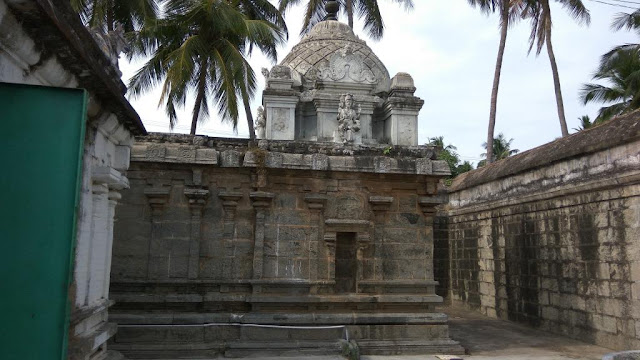Marundeeswarar Temple (Idaiyattrunathar Temple), T.
Edayar – The Temple
This is a west facing temple and has a
three-tiered gopuram, the gateway tower and all the shrines of the temple
are enclosed in concentric rectangular granite walls. The central shrine is
approached through the gateway tower, a mukha mandapa and an Ardha mandapa, all
of which are axial to the sanctum. There is no flag post (Dwajasthambam) in
this temple. The central shrine houses the image of Marundeeswarar in the form
of Lingam. The central shrine is approached through a
Mahamandapam and Arthamandapam.
Presiding Deity is called as Idaiyatreeswarar
/ Idaiyattru Nathar / Marundeeesar / Sivanandeswarar / Krupapureeswarar
/ Adimathyarjuna Eswarar. Lord Shiva in this temple is a Swayambumurthy
(self-manifested). It is believed that Lord Suryan (Sun) worships Lord Shiva of
this temple by directing his rays on the lingam on the 15th and
16th of the Tamil month of Maasi (Feb-Mar) from 5.00 p.m. to 5.15 p.m.
In this temple, Lord Shiva and Goddess Parvathy are
depicted in their wedding posture. In this temple, Lord Shiva is facing west
and Goddess Parvathi is facing east, as if they are exchanging garlands i.e.
Kalyana Kolam in contrast to the Upadesa posture as in other temples with a
similar orientation. Hence this temple is famous with devotees seeking wedding
boon. Devotees facing prolonged delays in their marriage proposals worship the
lord here and take the garlands exchanged between the God and Goddess to their
homes. It is believed that doing this will remove obstacles from their marriage
proposals.
Mother is called as Sitridainayaki / Gnanambika. The shrine of Gnanambigai is on the
South-Western corner of the temple facing East. The shrine of Irulneeki Thayar
(also called Anthaga Nivarini), facing West is located in a shrine behind
sanctum. As in other Shiva temples in Tamil Nadu, the shrines of Vinayaka,
Murugan, Navagraha, Chandikeswara
and Durga are located around the precinct of the main
shrine. Traditionally, Lord Murugan (as Somaskanda) is seen between the shrines
of Lord Shiva and Goddess Parvathi. However, in this temple Lord Vinayakar
(Bala Ganapathy or “Infant Ganapathy”) occupies Lord Muruga’s place.
As per the stone inscriptions available here, Lord
Vinayakar of this temple is also named as “Marutha Ganapathy” and “Polla
Pillayar”. Interestingly, Lord Murugan is referred to as “Kaliyugarama
Pillayar”. There is another shrine for Lord Vinayakar here which can be seen
amid a farm at about one kilometer from this temple. It is believed that this
is the Vinayakar that blessed saint Marai Gnanasambandhar. This Vinayakar is
also praised as Maruthai Pillayar and Gnanasambandha Pillayar.
Sage Agasthya came to this place
during his pilgrimage, made a Linga and worshipped the Lord. This Linga is worshipped as Agasthya Linga. The
shrine of Agastheeshwarar is located in the second precinct in the South-eastern
direction. There is also a small shrine for Sukha Brahma Rishi in the outer
corridor. As Sukhabrahmma Maharshi worshipped in this place, there is a
huge number of parrots in this place.
Shrines and idols of lords Balamrutha Vinayakar, Murugan
with his consorts, Dakshinamurthy, Durgai, Chandikeswarar, Saptamadakkal,
Navagraham and Saint Marai Gnana Sambandhar can be seen in the corridors. Theerthams
associated with this temple are Virudhapinakini (Pennai river) and Sitridai
Theertham (well). Sthala Vriksham is Marutham tree. There are several
inscriptions from the Chola, Pandya and Vijayanagar periods here.



























